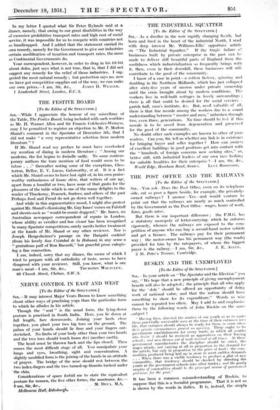THE INDUSTRIAL SQUATTER
[To the Editor of the SPECTATOR.] Stn,—As a dweller in the now rapidly changing South, but born and bred d in the heart of the industrial North, I read with iicip interest Mr. Williams-Ellis' 'opportune article On The Industrial Squatter." If the tragic failure of businesses built by private enterprise in the past can be made to deliver still beautiful parts of England front the sordidness which industrialization so frequently brings with it, then, even in their downfall, these businesses will still contribute to the good of the community.
I know of a ease in point—a cotton factory, spinning and doubling in the Northern Midlands, which has just collapsed after sixty-five years of success under private ownership until the crisis brought about by modern conditions. The workers live in well-built cottages in lovely surroundings ; there is all that could be desired for the social services – parish hall, men's institute, 8:e. But, most valuable of all, there is that fine morale among the workers due to a sound understanding between " master and men," unbroken through two, even three, generations. No time should be lo it if this morale is to be saved from degeneration and preserved for the good of the community.
No doubt other such examples are known to other of your readers. Can you, Sir, tell us whether any link is in existence for bringing buyer and seller together ? How can .owners of excellent buildings in good positions get into contact with the " hundreds of foreign concerns now seeking sites," or, better still, with industrial leaders of our own race looking for suitable localities for their enterprise ?—I am, Sir, &c.,
Weald Edge, Horeham Road, Sussex. Lucy RoBINSON.


































 Previous page
Previous page